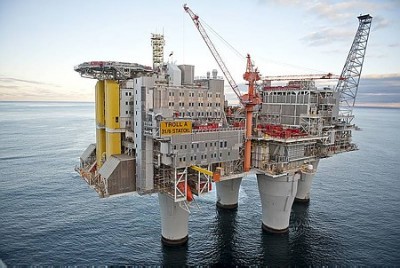Norway’s enormous “oil fund” generated more money last year than most mere mortals can fathom, but that didn’t quiet its critics. Investments in gaming and casino properties, for example, set off charges of immorality, while environmentalists aren’t happy either.

The huge stash of money fueled by Norway’s oil revenues has ranked as the world’s largest sovereign wealth fund for many years, and it’s invested outside Norway’s borders to provide pensions for future generations. Its managers announced the oil fund’s second-best results ever on Friday, reporting that it earned a record NOK 692 billion (USD 115 billion) in 2013 and recorded average returns of 15.9 percent.
“It was a good year for the fund, and returns of 15.9 percent are the next best in the fund’s history,” Øystein Olsen, chief of Norway’s central bank, announced along with Yngve Slyngstad, director of the central bank unit in charge of the fund, Norges Bank Investment Management (NBIM).
Measured in terms of kroner, the oil fund has never earned more money during the course of just one year.
Slyngstad attributed the strong results to returns on stock market investments. He said that 2013 was “a year with more moments of uncertainty in the world economy, but we still saw a broad upturn in the stock markets.”
Norwegian Broadcasting (NRK) noted that the fund has followed up sales of stock in controversial investments in palm oil companies with reductions in coal and mining companies. It has earned billions, though, on companies involved in the gambling business, and a Norwegian organization representing gaming addicts (Spillavhengighet Norge) called such investments “immoral” and hypocritical, given efforts in Norway to reduce money games. Casino operations and poker, for example, are illegal in Norway and lotteries are strictly regulated, but the oil fund has boosted its investments in the sector, reported NRK.
Among them is a large stake in Las Vegas Sands, which operates casinos in the US and Southeast Asia. The fund has also bought into Malta-registered Unibet, which some Norwegian athletes have also been involved with and been reprimanded for later.
Lill-Tove Bergmo of the anti-gaming group accused the oil fund of “double morals” (hypocrisy), and claimed it was wrong for Norway to contribute to activity abroad that it restricts or outlaws at home. Environmentalists, meanwhile, still aren’t satisfied with the fund’s investments in coal companies, and wants more sell-offs.
The fund’s investments are guided by an ethics council that makes recommendations to the Finance Ministry and the central bank. Investment practices have been up for hearings this winter, and are subject to new legislative review in parliament this spring.
newsinenglish.no/Nina Berglund

